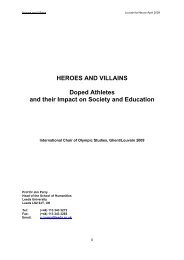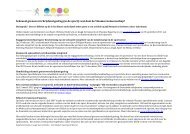Part 3 GLOBAL ISSUES: HARASSMENT AND ABUSE RESEARCH
Part 3 GLOBAL ISSUES: HARASSMENT AND ABUSE RESEARCH
Part 3 GLOBAL ISSUES: HARASSMENT AND ABUSE RESEARCH
You also want an ePaper? Increase the reach of your titles
YUMPU automatically turns print PDFs into web optimized ePapers that Google loves.
3.10 What price gold medals? An investigation into the negative emotional<br />
responses of child athletes to their coaches in the UK<br />
Misia Gervis<br />
Background<br />
In the pursuit of excellence, sport is demanding more and more from its<br />
young elite performers. Young athletes are training longer and harder, and are<br />
spending significantly more time with their coaches. Sport completely dominates<br />
their lives and the relationships that they have with their coaches can become<br />
more important to them than those with their parents. The prevailing culture in<br />
elite sport is one where child athletes are expected to be compliant with the<br />
demands of the coach if they are to be successful. The emotional and<br />
psychological response of such child athletes to these conditions and the<br />
potential for mental injury of these child athletes in these circumstances has<br />
largely been ignored. The outside world does not perceive the children to be ‘at<br />
risk’; indeed, in general the perception is the opposite. Performance<br />
achievements mask the process through which they are realised, and there is an<br />
acceptance that the ends justify the means.<br />
Until now the development of the understanding of emotional abuse of<br />
children has come from outside of sport and has essentially focused on childparent<br />
relationships. This research has examined the pairing of parental<br />
behaviour with the child’s emotional well-being. This dual focus on parental fault<br />
and state of the child is evident in the literature with questions being raised about<br />
establishing a causal relationship between parental behaviour and<br />
psychopathology in the child. 1<br />
It has been recently acknowledged that all forms of child maltreatment<br />
have an emotional or psychological consequence for the child but, because it is<br />
often internalised and so ‘invisible’, emotional abuse has received less attention<br />
from clinicians and researchers than other forms of child maltreatment. It may,<br />
however, have consequences that greatly outweigh and outlast the physical<br />
injuries, or the physical results of neglect or the sexual abuse (see Fig. 3.2).<br />
69<br />
69
















